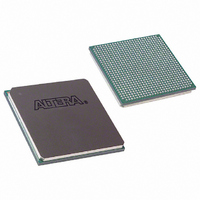EP1S10F780I6N Altera, EP1S10F780I6N Datasheet - Page 846

EP1S10F780I6N
Manufacturer Part Number
EP1S10F780I6N
Description
IC STRATIX FPGA 10K LE 780-FBGA
Manufacturer
Altera
Series
Stratix®r
Datasheet
1.EP1S10F484I6N.pdf
(864 pages)
Specifications of EP1S10F780I6N
Number Of Logic Elements/cells
10570
Number Of Labs/clbs
1057
Total Ram Bits
920448
Number Of I /o
426
Voltage - Supply
1.425 V ~ 1.575 V
Mounting Type
Surface Mount
Operating Temperature
0°C ~ 85°C
Package / Case
780-FBGA
Lead Free Status / RoHS Status
Lead free / RoHS Compliant
Number Of Gates
-
Available stocks
Company
Part Number
Manufacturer
Quantity
Price
Company:
Part Number:
EP1S10F780I6N
Manufacturer:
ALTERA
Quantity:
3 000
- Current page: 846 of 864
- Download datasheet (11Mb)
Voltage Regulators
14–6
Stratix Device Handbook, Volume 2
Table 14–3
compared to switching regulators.
You can minimize the difference between the input and output voltages
to improve the efficiency of linear regulators. The dropout voltage is the
minimum allowable difference between the regulator’s input and output
voltage.
Linear regulators are available with fixed, variable, single, or multiple
outputs. Multiple-output regulators can generate multiple outputs (e.g.,
1.5- and 3.3-V outputs). If the board only has a 5.0-V power voltage
supply, you should use multiple-output regulators. The logic array
requires a 1.5-V power supply, and a 3.3-V power supply is required to
interface with 3.3- and 5.0-V devices. However, fixed-output regulators
have fewer supporting components, reducing board space and cost.
Figure 14–3
regulator.
Figure 14–3. Three-Terminal, Fixed-Output Linear Regulator
Adjustable-output regulators contain a voltage divider network that
controls the regulator’s output.
a three-terminal linear regulator in an adjustable-output configuration.
Requires few supporting components
Low cost
Requires less board space
Quick transient response
Better noise and drift characteristics
No electromagnetic interference (EMI)
radiation from the switching
components
Tighter regulation
Table 14–3. Linear Regulator Advantages & Disadvantages
V
IN
shows the advantages and disadvantages of linear regulators
shows an example of a three-terminal, fixed-output linear
Advantages
IN
Linear Regulator
Figure 14–4
ADJ
Less efficient (typically 60%)
Higher power dissipation
Larger heat sink requirements
shows how you can also use
OUT
Disadvantages
Altera Corporation
1.5 V
January 2005
Related parts for EP1S10F780I6N
Image
Part Number
Description
Manufacturer
Datasheet
Request
R

Part Number:
Description:
CYCLONE II STARTER KIT EP2C20N
Manufacturer:
Altera
Datasheet:

Part Number:
Description:
CPLD, EP610 Family, ECMOS Process, 300 Gates, 16 Macro Cells, 16 Reg., 16 User I/Os, 5V Supply, 35 Speed Grade, 24DIP
Manufacturer:
Altera Corporation
Datasheet:

Part Number:
Description:
CPLD, EP610 Family, ECMOS Process, 300 Gates, 16 Macro Cells, 16 Reg., 16 User I/Os, 5V Supply, 15 Speed Grade, 24DIP
Manufacturer:
Altera Corporation
Datasheet:

Part Number:
Description:
Manufacturer:
Altera Corporation
Datasheet:

Part Number:
Description:
CPLD, EP610 Family, ECMOS Process, 300 Gates, 16 Macro Cells, 16 Reg., 16 User I/Os, 5V Supply, 30 Speed Grade, 24DIP
Manufacturer:
Altera Corporation
Datasheet:

Part Number:
Description:
High-performance, low-power erasable programmable logic devices with 8 macrocells, 10ns
Manufacturer:
Altera Corporation
Datasheet:

Part Number:
Description:
High-performance, low-power erasable programmable logic devices with 8 macrocells, 7ns
Manufacturer:
Altera Corporation
Datasheet:

Part Number:
Description:
Classic EPLD
Manufacturer:
Altera Corporation
Datasheet:

Part Number:
Description:
High-performance, low-power erasable programmable logic devices with 8 macrocells, 10ns
Manufacturer:
Altera Corporation
Datasheet:

Part Number:
Description:
Manufacturer:
Altera Corporation
Datasheet:

Part Number:
Description:
Manufacturer:
Altera Corporation
Datasheet:

Part Number:
Description:
Manufacturer:
Altera Corporation
Datasheet:

Part Number:
Description:
CPLD, EP610 Family, ECMOS Process, 300 Gates, 16 Macro Cells, 16 Reg., 16 User I/Os, 5V Supply, 25 Speed Grade, 24DIP
Manufacturer:
Altera Corporation
Datasheet:












